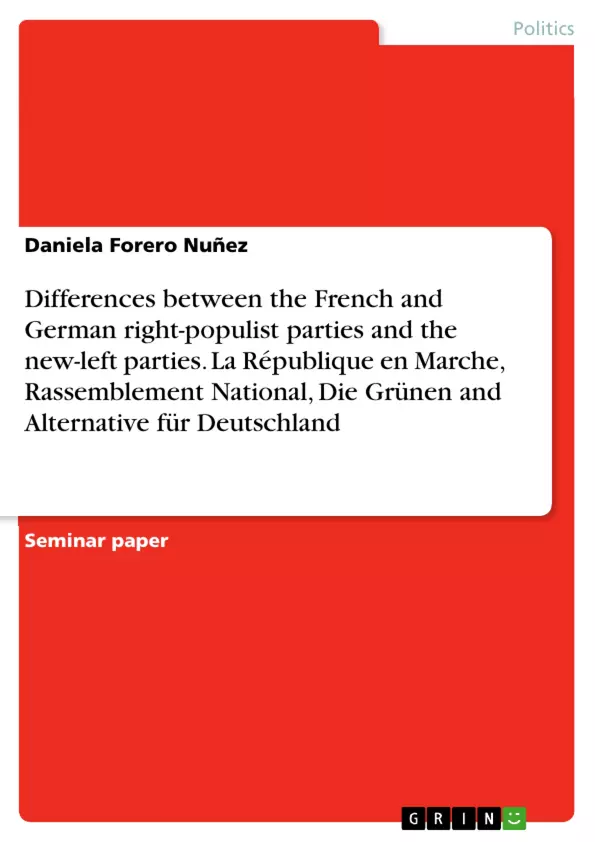This paper aims to analyze whether there are any significant national differences between the French and German right-populist parties Rassemblement National and the Alternative für Deutschland and the new-left parties La République en Marche and Bündnis 90/Die Grünen in their approving or disapproving positionings regarding immigration and multicultural identity, two of the most prominent cultural issues nowadays. The so-called social individualization shaped sociological discourse, especially in Germany, until the 1980s, challenging the previous conception of a rather static social structure, predetermined by class and status.
Recently, in view of the increasing social inequalities in western societies, concepts like class and cleavage seem to reappear in the debate. The reincarnation of class in post-modern societies makes room for diametral opposite living environments and lifestyles hard to reconcile with each other. Moving to the political dimension, the concept of cleavage1 links individual political values and beliefs with macro-institutional aspects of political systems, enriching thus the debate on how political parties mobilize particular social groups. Given that this development concerns several western societies, a row of terms has emerged to illustrate this phenomenon in different national contexts.
Western European political systems have responded to the increasing relevance of the cultural dimension and have reconfigured themselves, giving birth to and consolidating right-populist parties since the 2010s. Globalization has further accentuated this cultural conflict line, making room for fully antagonistic views on cultural issues, such as immigration. Hence, political parties have turned into agents of the political-cultural ressentiment resulting from globalization, or have moved towards more progressive political agendas, appealing to those generally profiting from a changing world.
Inhaltsverzeichnis (Table of Contents)
- Introduction
- Theoretical framework
- The transformation of the social structure: the winners vs. the losers of globalization
- The cultural conflict line and the rearrangement of the political party landscape
- Right-populist parties vs. new-left parties
- Globalization and the intensification of the cultural line of conflict
- Research design
- Selected parties
- Selected issues
- Research hypotheses and variables
- Research method
- Empirical analysis
- General intra-party observations and trends
- The right-radical party family and the losers of mobilization
- The new-left party family and the winners of mobilization
- Evaluation of the party positionings
- Summary of the empirical findings
- Conclusion
Zielsetzung und Themenschwerpunkte (Objectives and Key Themes)
This paper examines the influence of globalization on the cultural conflict line in French and German politics, focusing on the positioning of right-populist and new-left parties regarding immigration and multicultural identity. The study aims to empirically test theoretical premises, particularly those related to the "winners" and "losers" of globalization, and to assess whether national differences exist between these party families.
- Transformation of the social structure and the emergence of distinct social groups (winners vs. losers of globalization)
- The cultural conflict line as a driver of political mobilization and party positioning
- The influence of globalization on the intensification of the cultural conflict line
- National differences in the political landscape and party strategies regarding immigration and multicultural identity
- The role of right-populist and new-left parties in articulating the concerns of different social groups
Zusammenfassung der Kapitel (Chapter Summaries)
- Introduction: The introduction establishes the context of the study, highlighting the emergence of a "cultural conflict line" in Western societies, characterized by distinct social groups with differing values and political preferences. The paper aims to investigate the political expressions of this conflict, particularly in France and Germany, focusing on right-populist and new-left parties.
- Theoretical Framework: This chapter provides a theoretical overview of the social and political transformations associated with globalization. It discusses the emergence of the "winners" and "losers" of globalization, defined by their positions within the changing social structure, and explores the concept of the "cultural conflict line" as it relates to political mobilization and party strategies.
Schlüsselwörter (Keywords)
Globalization, cultural conflict line, right-populist parties, new-left parties, immigration, multicultural identity, social structure, winners vs. losers, political mobilization, party positioning, France, Germany, Rassemblement National, Alternative für Deutschland, La République en Marche, Bündnis 90/Die Grünen.
- Arbeit zitieren
- Daniela Forero Nuñez (Autor:in), 2022, Differences between the French and German right-populist parties and the new-left parties. La République en Marche, Rassemblement National, Die Grünen and Alternative für Deutschland, München, GRIN Verlag, https://www.hausarbeiten.de/document/1256852


